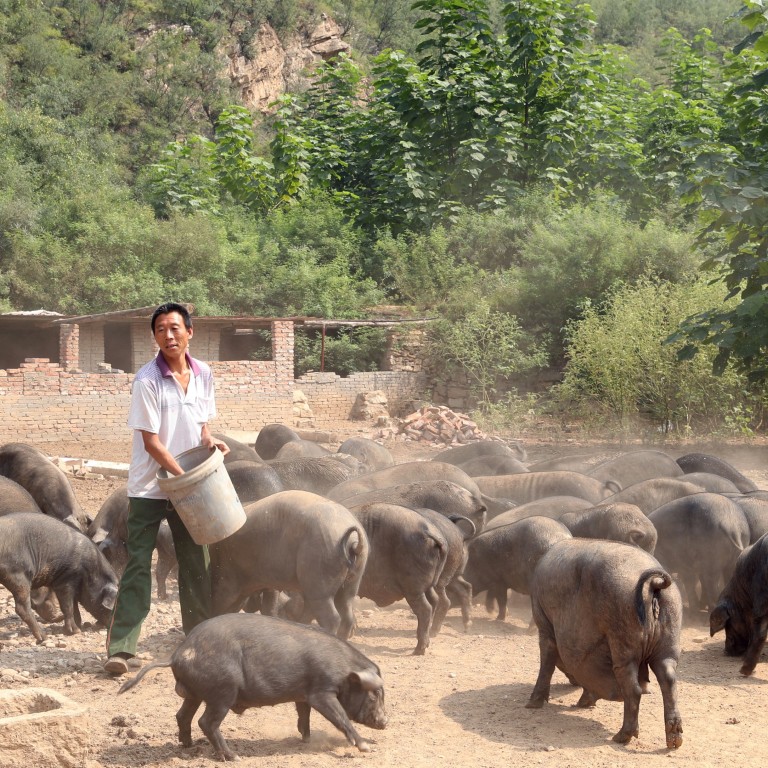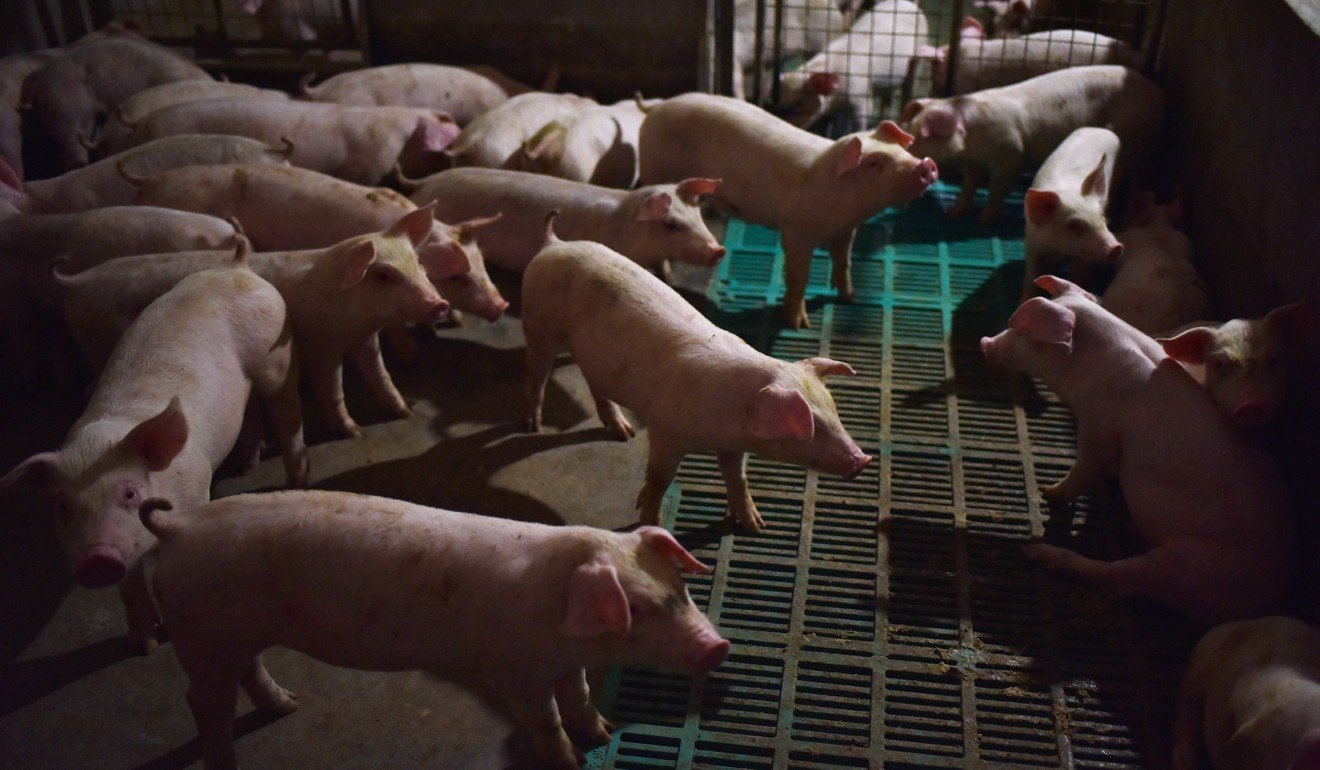
China declares victory over African swine fever but cover-up claims call success into question
- Vice agriculture minister Yu Kangzhen said number of cases is falling but industry insiders fear outbreaks are going unreported
- Fears remain that local authorities are covering up the spread and journalists said they have been ordered not to cover the story due to fear of spreading panic
African swine fever is spreading and becoming more entrenched in China despite assurances that the situation has been brought under control according to industry insiders, with fears local authorities are covering up outbreaks while journalists are being ordered not to cover the story due to fear of spreading panic.
According to the government, the virus has spread to all provinces apart from Tibet, Xinjiang and Hainan, just seven months after the first case was confirmed last August.
While official figures suggest the number of cases is tailing off, industry figures have questioned whether this is down to an increasing reluctance to report cases rather than effective disease controls. The disease, which is not harmful to humans but is deadly for pigs, poses a serious threat to the country’s farming industry and support industries, such as animal feed.
Supply shortages and possibly higher prices caused by the disease would also affect Chinese consumers, for whom pork is a staple meat.

The virus has spread to other many countries, from Vietnam to Australia, and a red flag was raised for the United States market after the federal agents recently seized one million pounds of pork smuggled from China – although there was no indication that the meat had been contaminated with African swine fever.
China’s Ministry of Agriculture, the authority in charge of virus control, has announced 113 reported cases of the disease so far, including two in March, seven in February and five in January, a significant fall from 21 in December and 25 in November.
On Wednesday, vice agriculture minister Yu Kangzhen declared a tentative victory in containing the swine fever outbreak, citing the drop in reported cases, and announced that blockades in 105 affected areas had been lifted.
At the same time, Beijing has ordered all slaughter houses to conduct bio-checks for the virus starting on May 1 to prevent any contaminated pork meat from entering the market or scraps of pork from being used as pig feed. However, question marks remain over whether the significant drop in reported African swine fever cases is a result of effective controls or local authorities becoming increasingly reluctant to report new outbreaks.
The World Organisation for Animal Health declined to comment on the possibilities of under-reporting. The organisation said that it “does not make public comments on rumours around the different animal diseases.” However, it continued that it “analyses all the factual circulating information and develops an active search for non-official information” relating to human and animal health.
A majority of pig farms in Hebei have found cases of swine fever, and the situation is similar in neighbouring Henan and Liaoning provinces. Most cases were not reported.
Sun Dawu, the chairman of Hebei Dawu Agriculture Group, a company that operates pig farms in the province, said that African swine fever in Hebei is much more serious than the official figures indicate because many cases have not been reported.
“A majority of pig farms in Hebei have found cases of swine fever, and the situation is similar in neighbouring Henan and Liaoning provinces,” Sun said. “Most cases were not reported”.
Last month, Sun said, about 15,000 pigs had died from the fever in Xushui County in Hebei province but the local authority had covered it up.
China’s agriculture ministry later confirmed that the first case of African swine fever in Hebei province had occurred in Xushui County but did not confirm the number of pigs that had died.
A general manager from a large animal vaccine company in Beijing who asked to remain anonymous said about 60 or 70 per cent of major farms in Hebei had been affected.
“Many small farms and some medium and large-scale farms are still selling the pigs even though they have found swine fevers,” he said. “There are 99 core pig breeding farms in China. As of the end of February, fewer than 20 have not been hit by the fever.”
An employee of the China Animal Husbandry Group, which is one of the largest state-owned enterprises in China, said African swine fever was a devastating blow to China’s pig industry.
“We don’t have vaccines and we can’t control it through drugs. Factor in the high mortality rate, and we don’t have a good way of solving this problem,” he said.
More than a decade ago a highly infectious virus known as “blue ear disease” hit Chinese pig farms, infecting over 48,500 pigs and killing almost 18,600. But unlike African swine fever, China soon developed an effective vaccine and developed techniques to spot the disease. Some media outlets also said they had been ordered not to report anything that had not been officially confirmed.
“The main worry of the government is causing panic [in society],” one editor working in online media said. He added he has received several orders – both verbal and written – banning him from covering related stories. Four other people working for major Chinese media outlets confirmed that they had been given orders on how to cover African swine fever during the outbreak, but no orders had been issued recently.
Betsy Freese, an American agriculture editor, published an article on the Successful Farming website on March 13 under the headline “Why you can’t believe what China says about African swine fever” following a week-long trip to China earlier this month.
We don’t have vaccines and we can’t control it through drugs. Factor in the high mortality rate, and we don’t have a good way of solving this problem.
In the article, Freese cited a “meat export expert in China” who told her that “there are reported cases all across the country, but many cases are not reported”. Swine fever has also been found in pork products on sale in China.
At a press conference on March 1, Li Jingsheng, an officer from the Ministry of Public Security, said the police authority had detained 90 people in a total of 32 swine fever-related criminal cases, involving 140 tonnes of pork products.
At the same time, the number of pigs in China is falling sharply. According to the government’s monthly survey of 400 counties across the country, the number of live pigs at the end of February had fallen by 16.6 per cent compared with a year earlier, while the number of sows fell 19.1 per cent.
The lower supply of pork, in turn, is leading to higher consumer prices. The average price of pork across 16 Chinese provinces jumped by 36.9 per cent last week compared with the same period of last year, and rose 13.9 per cent from the previous week, according to the agriculture ministry.



